As early as 2008, women’s groups were salivating about the prospects of a female presidential candidate in 2016 who could actually win. Regardless of whether 2016 is the year America elects its first female president, it’s certainly going to be an election in which women (representing at least 54 percent of the vote) will influence the candidates, and potentially the results, to a greater degree than they ever have before.
In 2013, Emily’s List launched its Madam President campaign to put a female Democrat in the White House. Emily’s List President Stephanie Schriock said the U.S. needs to “create a nation where women’s leadership isn’t the exception, it’s the rule.”
On the Republican side, Maggie’s List is a federal political action committee that works to get fiscally conservative women to Congress. Founded in 2010, it provides training and get-out-the-vote programs as well as financial support to female congressional candidates who stand for “less government, more personal responsibility and strong national security.”
But now that 2016 is no longer conjecture and dreamwork, now that women have either declared themselves candidates or are lining up behind those who are, what is the current rhetoric? While this may be the first presidential election in which female candidates are being talked about as much as the men, what are today’s female political influencers saying about 2016 as the year of the woman?
It may surprise some that most of them are much less concerned with 2016 being a year about women and more concerned about electing a positive-thinking, problem-solving, global-savvy, inspirational candidate who can help lead the country through the issues that matter most to all human beings: national security and the economy. After all, in a nation that’s perhaps never embraced its diversity more than now, men and women wear the pants equally well.
Carly Fiorina is poised to prove it, now that CNN has amended the criteria for its Republican presidential debate on Sept. 16. All she has to do is poll in the top 10 in an average of “approved national polls” released between Aug. 7 and Sept. 10, and that should earn her spot in CNN’s top-tier debate. In her eyes, it’s a mere steppingstone to getting what she really wants: the chance to debate Hillary Clinton.
Here, Fiorina and 10 other dynamic and outspoken female political influencers told the Washington Examiner what they think about so-called women’s issues, the redefinition of feminism and what will get women to the polls in 2016.
PAM BONDI
Florida attorney general
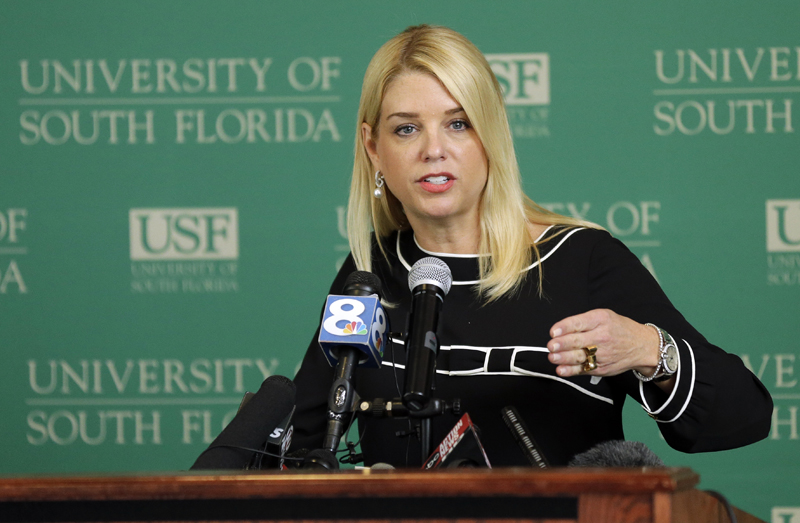
“Insulting, patronizing and patently absurd.”
That’s how Florida Attorney General Pam Bondi reacts to the notion that female voters are motivated only by “softer issues.”
“What makes a man care more about national security or the economy or defense than a woman?” she asked. “We care about these equally, and we need all Americans to pull together on these most important issues.”
Bondi, a Republican and Florida’s first female state attorney general, does not expect women’s issues to be examined any differently during the 2016 elections just because Hillary Clinton and Carly Fiorina are in the race. “We are a nation powered by diversity,” she said, “and discussions about gender issues are no longer headlines but part of the mainstream experience. But I do expect the women candidates to bring their fresh perspectives to the national debate.”
Bondi, who is an active supporter of Maggie’s List, which is a political committee that works to elect fiscally conservative women, suggested that Clinton and Fiorina are just the beginning. “We’ve broken through the glass ceiling. The sky’s the limit,” she said. “The only challenge now is to get more women involved. We have to get them to realize that the glass ceiling is gone. There are so many great women leaders in our country — we just have to convince them that they’re qualified.”
She noted that Democrats tried to incite gender wars in the 2012 election and suggested that “they’re overplaying their hand again” in 2016.
When asked what it will take to get women to the polls in 2016, Bondi said women will come because “the greater the stakes, the greater the turnout.” An example is President Obama’s nuclear agreement with Iran. “Israel is one of our greatest allies,” she said, ” and we have put them at risk with this agreement. I can’t imagine an election cycle more crucial than this one.”
In a vulnerable moment, she added, “I still hope I will be blessed to have children, and that their world will be a safe one. But no, I don’t think we can be safe with the new Iran agreement. No way.”
Bondi said she believes both sexes basically face the same challenges. “Women are trying to figure out how to succeed for their families, their communities and themselves just like men,” she said.
“Feminism used to represent the struggle for gender equality, but feminism today is simply women living and working in the highest leadership positions in government, business and community,” she continues. “Hillary says she wants to be the first woman president, but what we need is a candidate who wants to be president because she is the most qualified of all the candidates regardless of gender — someone who can truly lead the country forward.”
SARAH CHAMBERLAIN
COO and CFO, Republican Main Street Partnership
Sarah Chamberlain is frequently surprised when 2016 presidential candidates speak about the female vote. “I hear many candidates talking about abortion rights and other things they think are important to women, but women don’t talk about social issues so much,” she said. “In fact, the candidates with women running their campaigns don’t spend a lot of time talking about so-called women’s issues. They know that typical women’s issues don’t even register in the latest polls. American women are more worried about [the Islamic State], the economy, Obamacare and wages.”
An activist, entrepreneur and speaker, Chamberlain is COO and CFO of Republican Main Street Partnership, an organization dedicated to electing and defending legislators who will “govern effectively in the Republican tradition.” Chamberlain helped build the organization into a thriving network of nearly 70 members of Congress, as well as business and educational leaders.
Through its 501(c)(4) Main Street Advocacy, the group launched a popular nationwide campaign in 2014 called the Women2Women National Conversation Tour, a traveling series of meetings designed to connect, engage and motivate female voters. In 2015, the tour has been to Phoenix and San Francisco with additional stops planned in Las Vegas, Indianapolis, Miami and Atlanta in the coming months.
These casual, conversational meetings feature female members of Congress like Renee Ellmers, R-N.C. and Martha McSally, R-Ariz., joined by Chamberlain facilitating the discussion and taking questions from the audience.
Men can listen in, but they are told from the beginning that they need to sit in the back and remain quiet. That being said, Chamberlain said the Women2Women National Conversation Tour was started with a grant from a man and has “a lot of men involved.”
“What we hear from women during the tour is that they’re scared about the economy and how to pay the bills,” Chamberlain said. “And they don’t want to send their children to another war. But we’ve never had a single question about abortion.”
Interestingly enough, one question that does frequently come up on the tour is: Who are your male mentors? “Women in the audience assume we have male mentors, and the fact is that we all do,” she said. “My male mentor is 88 years old, and he believes that women can do anything.”
While the purpose of the tour is not to recruit women into running for office, Chamberlain said the audiences always ask the panel how they got into politics and how they manage work-life balance. “They want to know how these women political leaders make it work,” she said.
Chamberlain is passionate that getting women voters more engaged will help move the country forward. “Whether you like Donald Trump or not, I personally love that he got 24 million people to tune in to a debate that usually gets about two million people watching,” she said. “We’ve got to educate women on how important it is to be involved in the process and recognize that their engagement is what will turn things around.”
“Most women don’t necessarily want a woman in the White House,” she said. “They just want someone who can run this country successfully and who knows how to work with foreign leaders.” However, Chamberlain admits “it’s exciting that this election cycle could have women presidential or vice-presidential candidates on both sides at the same time.”
MARJORIE DANNENFELSER
President, Susan B. Anthony List
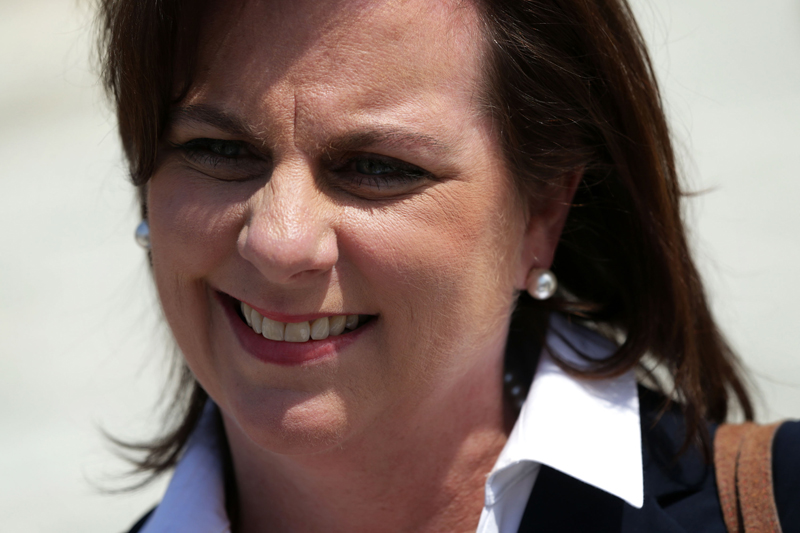
As president of the Susan B. Anthony List, a national pro-life group dedicated to pursuing policies and electing candidates to end abortion, Republican Marjorie Dannenfelser has thought about whether women candidates really bring something unique to the table and what it is that attracts the women vote.
“The McCain-Palin ticket was completely out of control,” she recalled. “Irresponsible journalists made vile assumptions about women, but it brought women together.”
She doesn’t like to think in terms of women’s issues but rather human issues. “Sometimes gender makes a difference, sometimes not,” she said. “Certain issues may impact a woman’s life, but it’s never her issue completely.”
Dannenfelser said the important thing is to deal with issues in reality. “Scare tactics leave reality. I can care for your issue, but I crave common ground,” she said. “I think women crave authentic debate.”
She said throughout history, feminism has been in a state of redesign. The early feminist suffragettes fought and won the right to vote. The debate about abortion hasn’t budged much in recent years, but it’s because no one is an island. Someone’s right may be someone else’s right deficit. “It’s very easy to drop the word feminism from conversation and just say what you mean because it’s not a useful term anymore,” she pointed out. “People don’t like to live to an ‘ism’ anymore.
“The frustration of getting nowhere leads you to argue issues as human rights,” she continued, “but it’s inappropriate to ever assume that women’s issues affect only women. They always affect someone else. For example, we can acknowledge that work-life balance problems exist, but these issues affect men and women in different ways.”
Dannenfelser said the key to greater voter turnout in 2016 is getting good information to women about the issues they care about, which include those that affect everyone as well as those that affect women disproportionately. The important questions are: What is the law? How would you change it? How much do you care about that?
“Everyone said debates are the most important thing, but the more important part of the story is communication between the candidates and groups with specific issues and concerns,” she said. “If there is no perceived difference between the candidates, that reduces voter turnout. If voters detest both candidates equally, that leads to apathy and low voter turnout. It is the biggest mountain to climb, but people’s minds and hearts can be turned if they get the right information.”
When Dannenfelser was “a young woman coming of age” at Duke University, she changed her mind on the issue of abortion. “There was a March for Women’s Lives in response to the Webster decision,” she recalls, “and I made my own sign that said, ‘Equal Rights for Unborn Women.’ I carried my sign and walked the opposite way of the march. A woman said to me, ‘You’re not the author of your own life. Someone needs to help you out.’ It was very demeaning. But I realized that while marching the opposite direction satisfied me, it wasn’t going to change culture.”
Years later when her daughter was born with special needs, Dannenfelser felt it was time to recommit. “It’s very hard to know the beauty of the life of a special needs child until you lived it,” she said. “We shouldn’t want to miss the unique beauty that every individual brings to the world.”
The key to connecting with women in 2016 is having an authentic conversation about our world’s most important issues, she said. “Women understand that you don’t get everything you want, but at least if there’s authentic conversation and debate, you’ll get some things that you want.”
SEN. JONI ERNST
Republican from Iowa
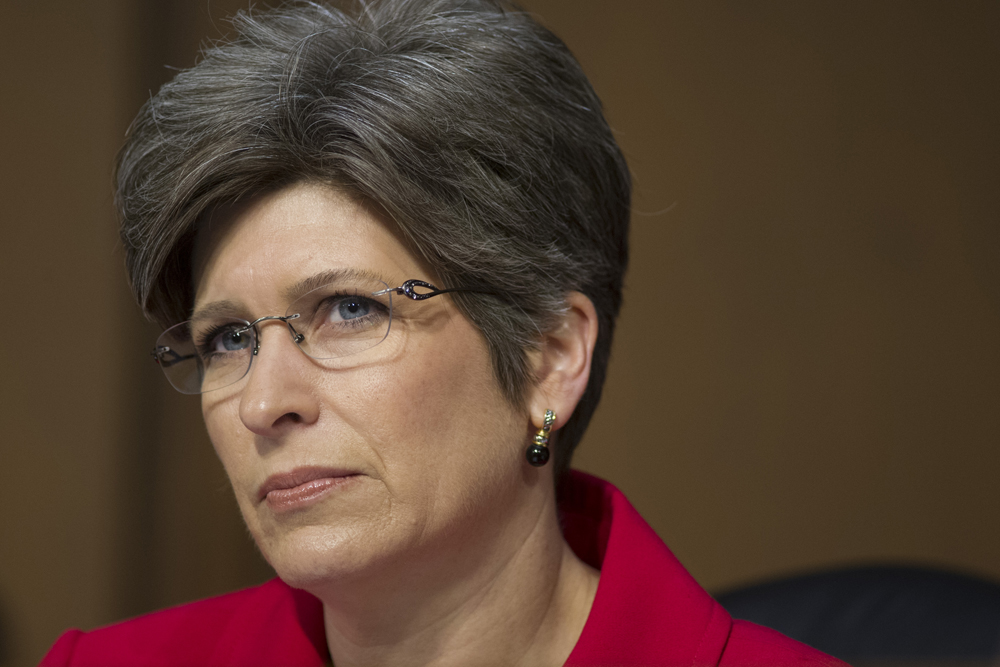
Joni Ernst, a veteran of the Army Reserve who served in Iraq, is the first female combat veteran elected to the Senate.
And because her state holds the first presidential contest on Feb. 1, Ernst is already influential. She doesn’t want to be called a kingmaker, but she clearly wants to play a role in the 2016 primary contests. She had no difficulty attracting seven Republican presidential aspirants to her “Roast and Ride” event in June. Carly Fiorina, Ben Carson, Mike Huckabee, Rick Perry, Scott Walker, Marco Rubio and Lindsey Graham all showed up. It’s entirely possible that Ernst may turn up as someone’s pick for vice president in 2016.
Whatever her ambitions, Ernst, like most military veterans, is not just a good speaker but also a good listener. She said she learned a lot about what women are thinking during her campaign last year.
For example, she said Democrats want to reduce the entire category of women’s issues to “choice,” but several issues are of equal or greater concern to a significant majority of women. While Ernst is strongly pro-life, she said women’s issues comprise concerns about jobs and our economy, national security, the search for a strong leader who can propel America out of its economic doldrums and the widespread crises and threats Washington is facing.
Ernst often talks to groups of women, including some she served with in the military. Just as during her campaign last year, she still finds that women are concerned about the need for a strong national economy and a strong national security strategy.
Contrary to almost every past national election, national security concerns are at the top of the issues stack for her constituents and will remain so in 2016, she said. Why? Because Iowans, like other people in this country, are swamped daily with news reports about overt threats such as from the Islamic State, and covert threats such as cyberattacks.
“We’re inundated every day with news of threats all over the world,” she said. Ernst rattled off a list that includes events in Yemen, China’s aggression, the massive hack attack at the Office of Personnel Management, which compromised millions of people’s personal and financial information, Russia’s incursion into Ukraine, and Islamist terrorism in Syria and Iraq. “Every issue of every newspaper,” she said, “is full of these problems.”
Ernst is also concerned with the problems that many female military veterans encounter. Like their male counterparts, they’re concerned with scholarships for college, promotions and pay, as well as the inevitable worries about future assignments. Ernst is particularly concerned with the problems veterans face re-integrating with their families after returning from long deployments. Fortunately, she said, a strong support system exists around and among Iowa veterans and active duty soldiers, but she knows it’s not like that everywhere.
Ernst said women are looking for someone who can be a real leader, someone who can “communicate principles clearly and effectively, a leader to be excited about.” Iowans, she added, are “hungry for leadership.”
CARLY FIORINA
Presidential candidate
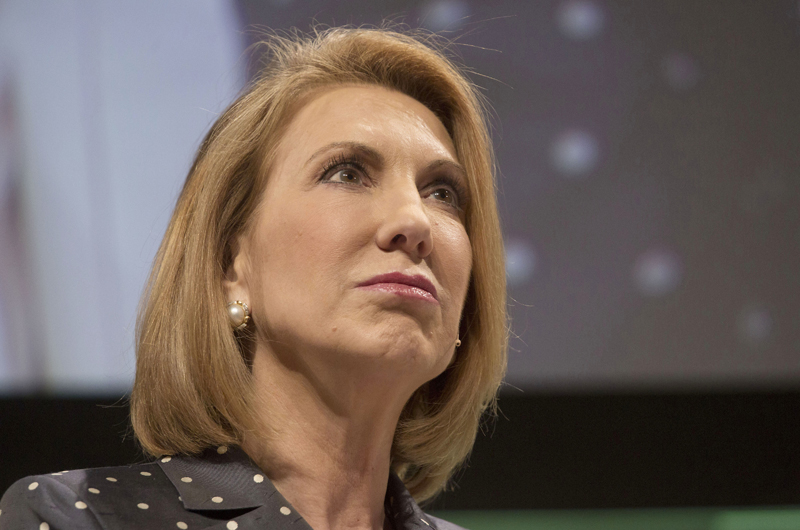
If it were up to Carly Fiorina, the next presidential election would be decided by a match between her and Hillary Clinton.
Born in Texas, Fiorina said she grew up “all over the place.” Her family moved with her father (a college professor) to Connecticut, California, upstate New York, North Carolina and London before she graduated from high school. Attending Stanford University, she worked as a Kelly Girl and a beauty parlor receptionist to help pay her way. After graduation, she tried law school, hated it, and went back to work as a receptionist in a real estate office.
She joined AT&T as a sales rep, advanced in her career and eventually was recruited to be CEO of Hewlett-Packard, the first woman to lead a Fortune 50 company. Although she grew Hewlett-Packard to the 11th largest company in America and doubled its revenue to $90 billion, Fiorina was fired, in what she once called a “boardroom brawl,” in 2005.
Since leaving Hewlett-Packard, Fiorina has written a bestselling memoir, Tough Choices, and served as chairwoman of the CIA’s advisory board as well as a member of the Transformational Diplomacy committee when Condoleezza Rice was secretary of state. She ran an unsuccessful Senate campaign in 2010, but remained politically active as the vice chairman of the National Republican Senatorial Committee. She serves as chairman of the American Conservative Union Foundation, which hosts CPAC, the largest annual gathering of conservatives.
She toiled at the lower end of the polls since announcing her run for president, that is, until her breakout performance in the undercard debate in August.
Fiorina gets fired up talking about her run. “I believe our nation is at a pivotal time. To quote Margaret Thatcher, ‘We are in the process of managing the decline of a great nation,’ and I am not prepared to stand by and watch us manage the decline of our great nation.”
She blames both parties, “the professional political class.”
Fiorina points to the Department of Veterans Affairs scandal as an example. “Every time we get a piece of news, it’s worse, and yet, VA has been a problem for 20 years. People will stand up and make speeches, and they might pass a law that said we can fire people, but as soon as the spotlight moves on, so will the professional political class.”
Fiorina said the U.S. needs leadership that will “challenge the status quo here in Washington and reestablish the leadership of our great nation around the world.”
When asked how women’s issues will affect the 2016 race, Fiorina said, “I don’t think there is any such thing as women’s issues, frankly. Women care about every issue. Women are now half the nation and 54 percent of voters, so I find the term ‘women’s issues’ deeply insulting.
“Democrats play identity politics,” she continued. “They put people into identity groups and then they pit one identity group against another. So women are an identity group, Hispanics are an identity group, you get the idea. That brand of identity politics is deeply divisive, and we cannot let them determine our language.
“Women care deeply about national security and foreign policy. They care about healthcare, the economy, education, job creation and immigration,” she said. “You name it, they care about it, and they’re perfectly capable of talking about it.”
Fiorina said she is looking forward to a scrap with Clinton. “Hillary Clinton is going to be the Democrats’ nominee and we gotta have a fight. This is a fight over the future of the nation. It’s a fight over what we expect from our leaders.”
It’s a battle, she said, over “whether we are content to permit the low-grade corruption and lack of transparency that Hillary Clinton is now famous for. She is the personification of the professional political class. And we know, based on what we’ve seen in the latest revelations about emails from the State Department, this woman has blood on her hands. She’s engaged in a cover up. And one of the reasons people are just letting it go by is because they think, ‘Well, that’s the way politics is.’ ”
Fiorina said many are content to accept this lack of leadership and trustworthiness, but she’s not. “And, yes, I’m itching to have that fight because I’m appalled.”
“People come up to me every day and say, ‘Thank you for answering my question. Thank you for speaking clearly. Thank you for being straightforward.’ Do you know what a low bar that is? It’s really a low bar to say it’s remarkable that a presidential candidate actually answers a question and speaks in a straightforward manner,” she said.
On national security, Fiorina is critical of the multinational deal with Iran on nuclear weapons. She said she would take a very different approach with the Iranian regime.
“I would get a message to the supreme leader that until you open every nuclear and military facility to inspections, anytime, anywhere, we will make it as difficult as possible for you to move money around the global financial system. We can cut off their access to the SWIFT system, [the Society for Worldwide Interbank Financial Telecommunication, which handles most international bank transactions], unilaterally. We can do that. We should do that. I would do that.”
Fiorina said it’s important because “they will use up all the money that flows in from sanctions relief — and by the way, even if Congress gets over the veto-proof majority and said no to this deal, the rest of the world has moved on.”
When the sanctions are lifted, she said, “China, Russia and the EU are in there trying to make money and Iran will use that money to sow disruption, to foment conflict and unrest, and to move weapons around the Middle East. They’ve practically said as much. And so we have to make it difficult for them to move money. It just has to be done.”
Fiorina said President Obama’s unintended message is clear. “All this bad behavior by Iran? We weren’t trying to stop it. So what message has this deal sent? The more bad behavior you engage in, the greater the reward.”
Fiorina said it’s the same message in Obama’s dealings with Cuba, Russia and China. “The more bad behavior you engage in, the more the United States, this president, will reward that behavior.”
Fiorina has a message of her own to American women: “American women are the majority of this nation. Women can change the direction of this great nation. It is within women’s power to elect the right woman and to change the course of this nation.”
SEN. AMY KLOBUCHAR
Democrat from Minnesota
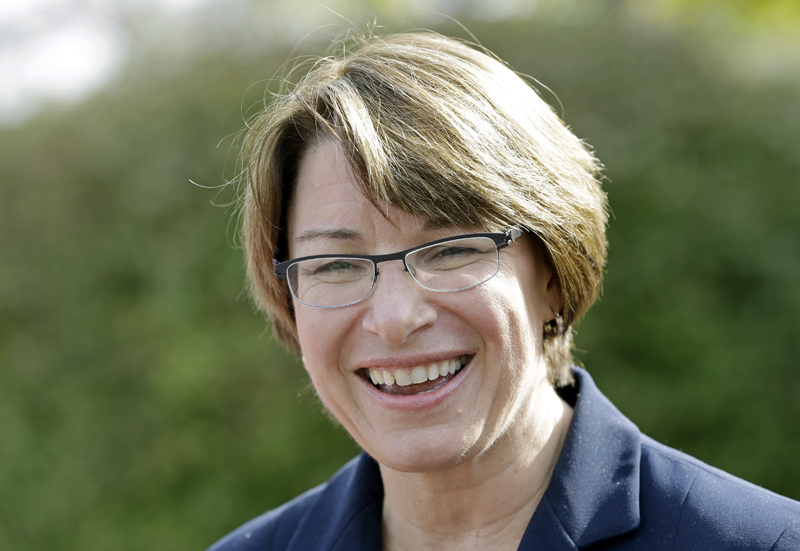
Minnesota’s senior senator, Democrat Amy Klobuchar, has a reputation for bipartisanship and wit. After seeing her at the Gridiron Club dinner two years ago, President Obama declared Sen. Al Franken to be the “second-funniest senator in Minnesota.”
Klobuchar began her political career running successfully for Hennepin County district attorney, where she served two terms and was known for cracking down on gun crime. Recently, she introduced an anti-sex trafficking bill with Sens. John Cornyn, R-Texas, Mark Kirk, R-Ill. and Heidi Heitkamp, D-N.D., as well as a bill to bolster science, technology, engineering and mathematics education with Sen. John Hoeven, R-N.D.
In fact, Klobuchar said she believes she has the most extensive record of bipartisanship. She points to the record she held about two years ago for passing bills with the Republican House, and she has one of the highest percentages of introducing bills jointly with Republican senators. “I work across the aisle very well,” she said. “I look for common ground. I look for what things we can agree on as opposed to disagree on. I think people expect that in my state.
“In 2016, the top women’s issue is the economy, which is also the top men’s issue. But time and time again, we need to look at the numbers that show women tend to have a higher percentage of minimum wage jobs,” she said.
She pointed out that because women sometimes take time off for children or are in lower-paying jobs, they tend to have less money for their retirement than men. Women generally live longer than men, she said, and should be encouraged to save more. “People usually think about the immediate economic issues for women, but there’s actually long-term economic issues with their retirement,” Klobuchar said, adding that she favors automatic check-offs in paychecks to fund individual retirement accounts.
Klobuchar doesn’t believe that voters in her state are singling out women’s issues as such because women’s issues are the economic issues. What she hears most from her constituents, especially mothers, is talk about whether their kids will be able to afford college and what kind of job they will get later.
“Some of these moms are working two jobs,” she said, “and though the economy has vastly improved in our state and we have a really low unemployment rate, expenses are still high for everything from cable TV to phone service.”
Looking at the 2016 presidential election, Klobuchar is enthusiastic about the likelihood that there will be at least one female candidate, Hillary Clinton, and possibly another in Republican Carly Fiorina. “The fact that you have such strong women running is incredibly important,” she said. “In the case of Hillary Clinton, you have the front-runner, and you have Carly Fiorina who’s had an extensive business career. They will be voices that people are going to listen to when it comes to these economic issues.”
Klobuchar said the numbers in the Senate “pretty much reflect” where the country is when it comes to local legislators. “In the Senate, we have only 20 senators who are women. Now that’s good because they can’t call us ‘the sweet 16’ anymore, but we’re not near where we should be. And I think the fact that these women are such serious candidates and will be competing in a very vigorous way with a bunch of guys shows that women’s time has come to be not just on the stage but on the ballot.”
Klobuchar believes Clinton will play well in her state for several reasons: Clinton grew up in the Midwest, she’s been running a grassroots campaign by going to small groups to speak directly to them, and Minnesota is a caucus state, which will be to Clinton’s advantage. She also believes Clinton will gain strength because of her support for rural policies embodied in congressional farm bills.
“It just gets more women to run for office when they see someone like Hillary Clinton on the stage in those debates as a front-runner,” she said. “It makes more women want to run for office because they think they can do it.”
REP. MIA LOVE
Republican from Utah
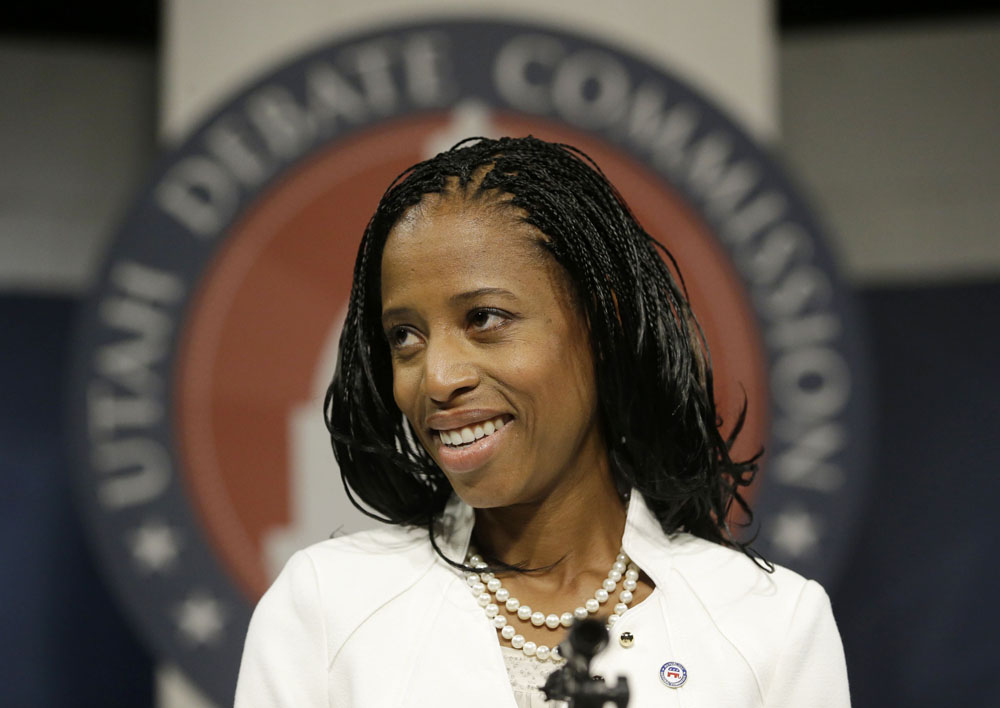
Rep. Mia Love, R-Utah, expects female contenders such as Fiorina and Clinton to have an impact on the national debate when it comes to women’s issues, but what she really hopes comes out of their campaigns is an awareness that women drive the economy.
“Women are the ones who see that the paycheck doesn’t buy as much food at the grocery store as it used to,” she said. “Women are the ones figuring out their family’s healthcare. Women are the ones leading the [parent teacher associations] and figuring out how to stretch education dollars even further.”
Love was raised in Connecticut, the daughter of Haitian immigrants who came to America just one year before her birth, unable to speak English and with just $10 between them. Her first foray into politics was winning a seat on Saratoga Springs’ City Council in 2003 in Utah. Six years later, she was elected mayor. In 2014, she became the first black Republican woman elected to Congress.
Love said being raised with modest means greatly affected her political outlook. “My father had a more obvious impact on my career, but my mother’s were subtle lessons over time,” she said. “She taught me that the world does not revolve around me. She taught the importance of putting others’ needs first before my own. She taught me that to be a leader, you have to be willing to put yourself in uncomfortable positions.”
Love has taken up many conservative causes, including her pro-life position on abortion, but she thinks that “upward mobility” is an issue that will affect female voters in 2016. “I have a happy life at home, and it’s not necessary for me to work in political office,” she said. “But I do it because, as a mom, I realize that the United States will not give my kids as many opportunities as I had growing up. That’s why I got into politics — for my kids’ future. It’s the most important thing that our children have a future, that they can be as positively extraordinary or a positively ordinary as they want to be.”
Love thinks women voters will get excited about a candidate who “recognizes how women drive the economy and offers the best positive agenda. We really need an inspirational leader today,” she said.
One good thing about candidates like Fiorina and Clinton and other female political influencers, she said, is that feminism is being redefined, and in both parties. “Feminism used to be defined by whether or not you wanted the door opened up for you. Now, feminism is about being confident about being a woman, a mother, a great wife, and taking responsibility for developing our God-given talents for our family, our community and our country. The good kind of feminism is recognizing that you have a voice to add.”
REP. MARTHA MCSALLY
Republican from Arizona
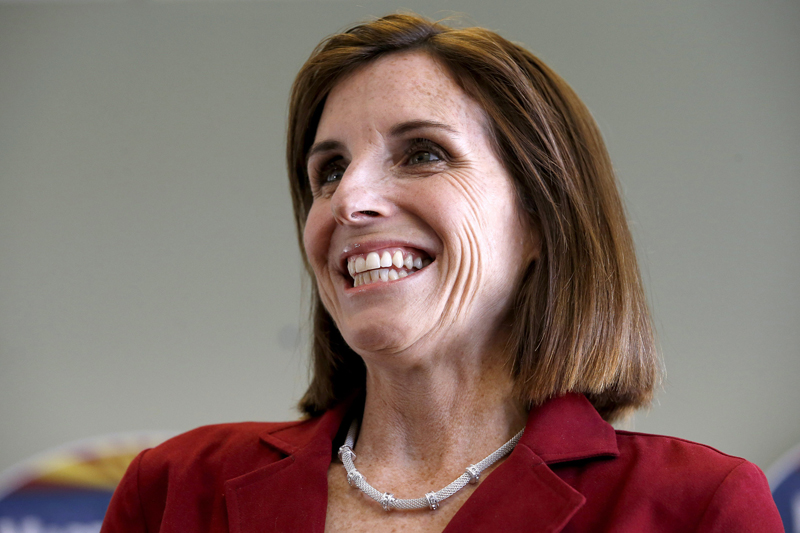
Rep. Martha McSally, R-Ariz., takes considerable delight in confounding people who try to stereotype her. Half-kidding, she said, “It’s part of my calling to create cognitive dissonance in people and confuse their thinking when they make stereotypes.”
Her resume is out of the ordinary. She’s an honors graduate from the Air Force Academy and a triathlete, the first female pilot to fly in combat and the first to command a squadron in combat. After retiring from the military, McSally was professor of national security studies at the George C. Marshall Center in Germany.
“I’ve been fighting stereotypes my whole life,” she said. She’s also been fighting for the rights of servicemen and women. When stationed in Saudi Arabia, McSally ran up against a Defense Department policy that required servicewomen to wear Muslim garb when off base. She challenged that policy and later sued the Defense Department. As a result, Congress reversed the policy.
McSally was elected to Congress in 2014 by the narrowest margin of any race in that election, fewer than 200 votes. That’s made her a careful listener.
“In my district,” she said, “what matters to most men and women — the things that are on the top of their list — are not the things that are divisive, but generally are kind of uniting, like economic opportunity and security.”
McSally objects to categorizing political matters as women’s issues or men’s issues. “It’s condescending to me, and I know it’s condescending to a lot of people to make those gross generalizations — especially, when they get so specific that the only thing that they seem to think is a women’s issue is anything that’s got to do with our uterus. We don’t just have a uterus, we have a brain.”
McSally is convinced that national security is going to be a big factor in the 2016 election, something she saw in her own election in 2014. “As I see it in our community,” she said, “we’ve got men and women who care about our freedoms and our security, having a strong military, and that our country and our community are safe.” Acknowledging that a focus on national security would be contrary to almost every other American presidential election, she stands firm in her prediction. People see what is going on around the world, she said, and what they see will affect the 2016 election. She ticked off a list that included the Islamic State, the rise of extremists, Russia and China, just for starters.
Though a lot of different issues can motivate, or demotivate, a man or woman to vote, McSally is convinced the country is at a crossroads. “We’ve had six-and-a-half years of the direction in which Obama wants to bring the country, and we’re going to have a contrast in futures ahead of us because Hillary Clinton generally offers more of the same,” she said. “We’ve got a lot of other perspectives from Republican candidates that offer a very different America, where we continue to be the leaders of the free world in security issues as well as in economic development and economic strength. It’s because we can’t afford a strong military unless we have a strong economy. The two go hand-in-hand and depend on each other.”
It bothers McSally that a woman has never been on the top of a national ticket, and that there will be some who vote for Clinton just because she’s a woman. “We have over 150 million women in the country, and we haven’t had someone who really can be a contender at this level? But just because we have a woman contender doesn’t mean we should vote for her. This is about leadership — it isn’t about gender.”
McSally hopes American women won’t be fooled by the gender issue. “The world is burning, and a lot of that is because of the lack of America’s leadership.”
In addition to national security and the economy, McSally thinks there’s a third issue that will turn out the vote. In fact, it’s what motivated her to run.
“People are just frustrated in general that Washington isn’t working for them. There’s this inside-the-beltway bickering and dysfunction, while outside the beltway, people are continuing to struggle. They’re wondering whether anybody’s got their back.” McSally said she wants everyone to “get mad, get engaged, and get informed.” And, of course, vote.
REP. KRISTI NOEM
Republican from South Dakota
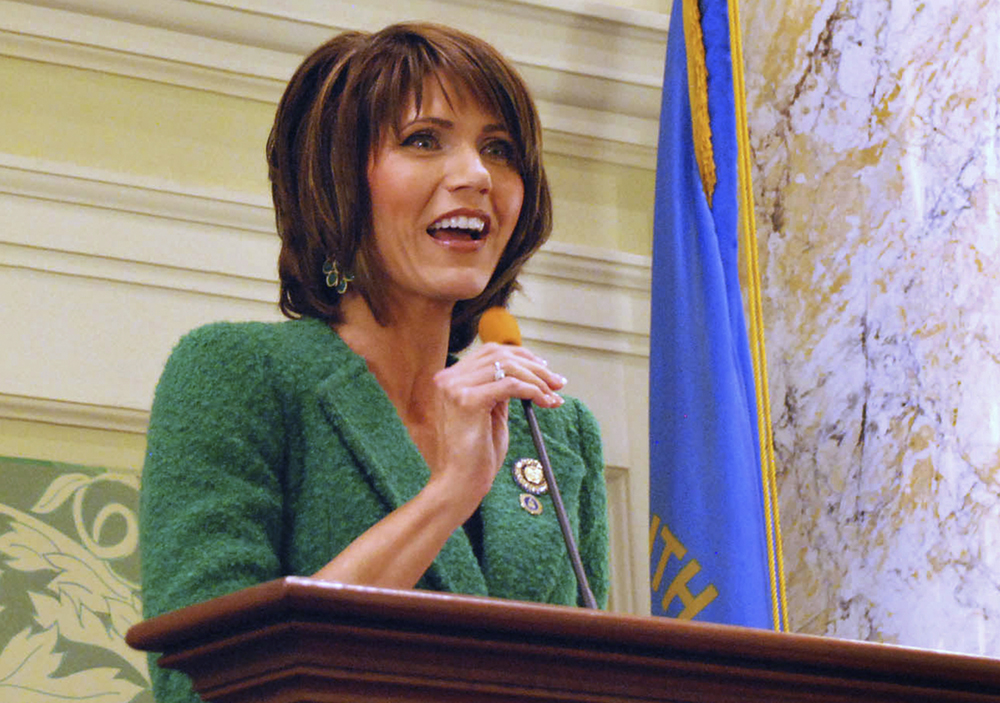
Kristi Noem is South Dakota’s only member of the House. A big state like that requires covering lots of ground and listening to lots of people.
But growing up on her family’s farm, Noem wasn’t interested in politics and neither was her family. During her college years, Noem’s father died in an accident, and she went home to help run the farm.
Her family was shocked by the impact of the estate tax. Propelled by her family experience, Noem proves the wisdom of Pericles, a statesman of ancient Greece, who said about 2,500 years ago: “Just because you do not take an interest in politics doesn’t mean politics won’t take an interest in you.”
Elected to the South Dakota legislature, she quickly rose to a leadership position and gained a reputation for pragmatism and determination. She ran for the House in 2010, attracting Ted Hustead as her treasurer, one of the state’s leading money men, and won (narrowly) against an opponent who had won the two prior elections with more than 70 percent of the vote.
She was quickly chosen as one of two freshmen members to represent her class in Republican leadership meetings.
Now in her third House term, Noem has concentrated on tax policy and trade issues. She holds a seat on the House Ways and Means Committee.
It hasn’t always been smooth sailing. In October 2013, with Noem facing re-election, South Dakota’s cattle industry was devastated by a snowstorm that killed tens of thousands of steers. With government offices closed because of a government-wide shutdown (making ranchers unable to apply for the usual government assistance), she pushed Congress for money to aid them that would come out of the Federal Emergency Management Agency.
Noem was criticized strongly for that, and other efforts she made on behalf of South Dakotans, because she had voted against federal relief funds for victims of Hurricane Sandy, which hit the East Coast in 2012.
When asked how the candidacies of Clinton and Fiorina would affect the discussion of women’s issues in 2016 campaign debates, Noem said, “Every issue is a women’s issue. There really aren’t women’s issues — just women’s perspective on all issues.” It’s a mistake, she said, to let women be boxed in on certain issues because they are concerned about everything going on in America.
Noem pointed out that women are the majority of voters. They pay the bills and make most family decisions on healthcare. The rapid and continuing rise in the cost of living leads American women to look for a candidate who shares their views and can chart a better path for the nation.
Noem believes that President Obama’s policies have hit women disproportionately hard. There have been, she said, many women-owned businesses that have failed in the past six years. Under Obama, women have lost their jobs, and those who can work haven’t seen wages increase as they should. She thinks women won’t vote for someone who is the most charming, but rather, someone who agrees with them and can solve problems.
In 2016, Noem sees that “healthcare is a very big deal for everybody” and believes the prospects for overhauling Obamacare will have a big effect on the vote.
She recalls a mother she ran into while both were shopping for groceries at 11 p.m. Both she and her constituent were tired after a long day. The woman told her about her family’s struggle dealing with the high, and growing, costs of groceries, gasoline and electricity. She told Noem about how she’d had to car pool with a friend to save on gas and missed her kids’ school and athletic events so that she could keep up with the demands of making a living. The woman said, “Kristi, when is it going to end?”
That, Noem said, is a question a lot of voters will be thinking about on Election Day 2016.
A young 43 years of age, Noem doesn’t have an obvious path to advance by graduating to a senate seat. With two popular Republican senators — John Thune and Mike Rounds — in her path, she’s likely to stick to her House seat for the foreseeable future. Like many congressmen from agricultural states, she’s not going to follow the toughest conservatives who demand cuts to all government spending, but she is one to watch among rising Republican leaders.
REP. KATHLEEN RICE
Democrat from New York
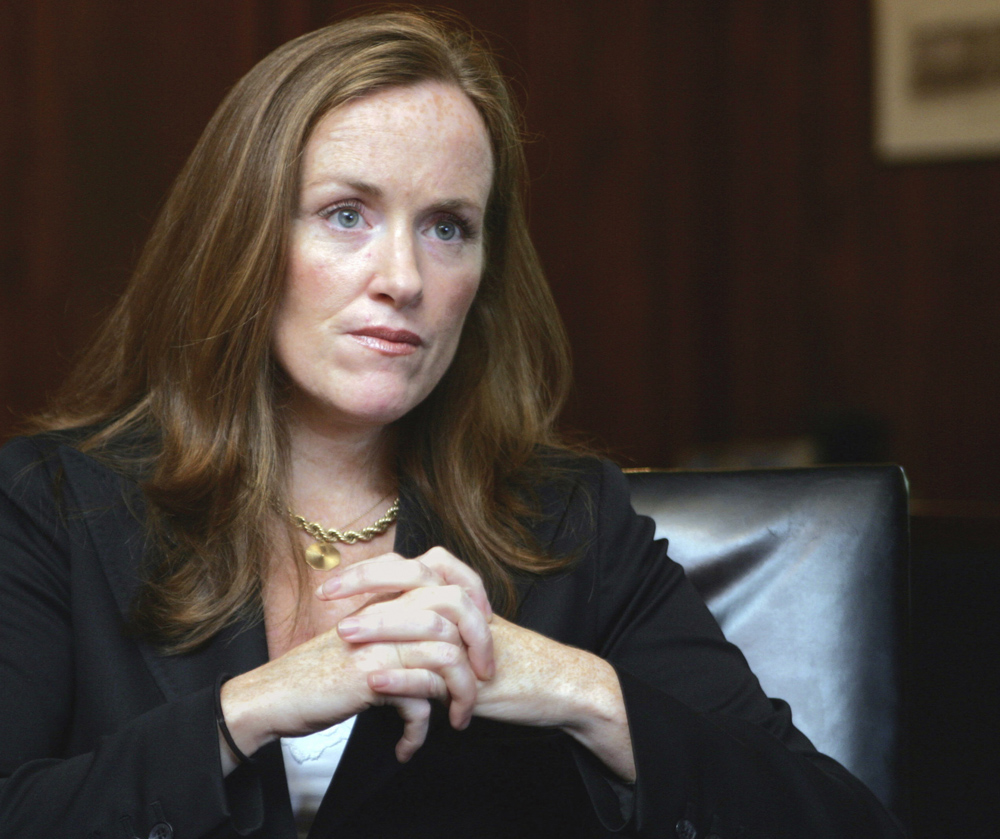
Asked what she believes will dominate discussions on women’s issues for 2016, freshman Rep. Kathleen Rice, D-N.Y., said the fact that Clinton is running is the biggest of those issues. “I think that women will really appreciate that we have such a strong, experienced woman in the race,” she said. “That’s not to say that all women will or should vote for Hillary Clinton just because she’s a woman, but I think it means something to see a woman well-engaged in the democratic process.”
Rice quickly admits, however, that she loathes talking about “women’s issues.” Why? Because the women she knows and talks to every day in her district care about the economy, foreign policy and education, “not just women’s health issues,” she said.
Rice thinks that in the 2016 race, both men and women will be focused on two things: jobs and homeland security. “There’s no question that jobs and the economy are on top of the list,” she said. “Right now, as we’ve seen steady recovery and job growth, voters are going to be eager to hear from candidates on what they’re going to do next.”
The question from voters, she said, is how to keep that progress going “to include more middle-class Americans in that recovery.”
“There is some more optimism about our economic future, but there’s still a lingering anxiety, at least in the people I talk to when I go back home,” said Rice, who served as New York’s Nassau County prosecutor for eight years and is known for convicting a host of public officials for corruption. “People want to hear about what the candidates are going to do to spur wage growth and make their families more economically secure.”
Rice believes the second biggest concern is homeland security (she serves on the House Homeland Security Committee). She attributes this to the rise of threats against Americans at home and abroad and points out that the media are filled with reports of those threats.
“People want to hear how the candidates will protect us, how would they do a better job tracking foreign fighters than we’re doing right now, including what strategy they have for fighting [the Islamic State] and how they’re going to confront terrorist groups in Africa,” she said.
With Clinton lagging in many polls, Rice said she’ll be out working hard for her. “Hillary Clinton holds a special place in my heart because she actually swore me in when I became D.A. I think she’s a great role model for women.”
Even so, Rice discounts recent polls and frets over the tendency that politicians have to not say anything before they’ve polled the effects. She believes that Clinton’s recent problems will be suffered by other candidates as the race goes on. “In the long haul, her numbers will get back to where they need to be for her to win,” she said.
Her prediction: Having Fiorina in the race will only enhance the conversation, and she doesn’t foresee that Fiorina’s presence will have a negative effect on Clinton.
MARJI ROSS
President of Regnery Publishing
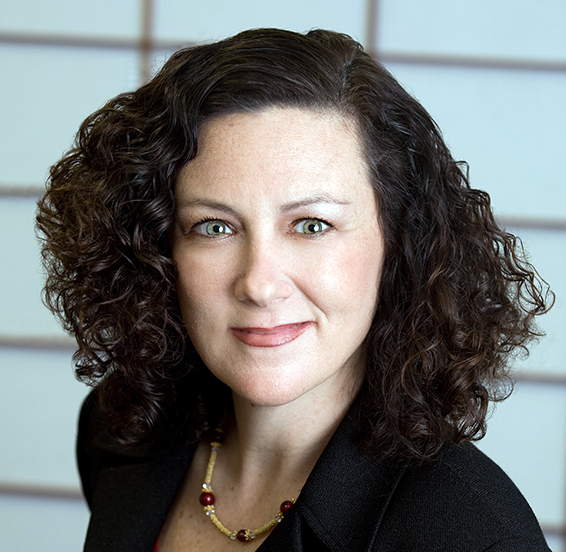
Marji Ross is president of Regnery Publishing, one of the country’s leading conservative publishers. Regnery is known for championing books that challenge the status quo and get people talking about the issues — think classics like Russell Kirk’s The Conservative Mind, William F. Buckley, Jr.’s God and Man at Yale and Whittaker Chambers’ Witness as well as works by contemporary conservative authors such as Ann Coulter, David Limbaugh, Newt Gingrich and Laura Ingraham.
“It’s great that we have strong women candidates for 2016, but that alone shouldn’t make women’s issues come to the forefront,” Ross said. “Women want someone they believe will make the U.S.A. better, and that’s the same as men. Women want a candidate that shares their values and beliefs. Women will vote on a demographic and psychographic basis rather than on gender.”
She noted that the significance of female candidates for president in 2016 is that Americans of both sexes love the idea of “firsts.”
“That’s a cool American thing,” she said, “and it’s a big reason that Obama got elected. Americans thought it was cool to have an African-American president. But that’s a stupid reason to elect someone, just as gender would be a stupid reason to vote for someone.”
As in any other election, Ross said voter turnout will be driven by fear or excitement. “And that easily could happen in a race where we have the first female as a candidate by a major party,” she said. “On college campuses, students get excited about having the first woman president because they like what that said about America today. So it’s a challenge to the Republican Party because it’s extraordinarily likely that the Republican candidate will be a man. Republicans have to put forth a candidate that women voters can get excited about.”
Women represent 54 percent of the voters, but Ross cautions that that doesn’t mean much in an election. “You can’t carve out more than half the population and get them to agree on anything,” she said. “Women aren’t united on abortion, for example. The good news is that more women now say Republicans share their core values and beliefs.”
She said women connect with all of the major issues our country faces. “Defense and military touch both genders. What woman doesn’t want her son or daughter to be safe when serving their country? What’s the proper role for women in the military? When you look at the economy, why aren’t women paid as much as men? You can make anything a gender issue.
“The point is that the candidate has to resonate with them. It’s a problem if conservative women aren’t excited about voting Republican. The candidate has to convince women that they really understand. It’s a communication issue. The Republican challenge to winning the presidential race will be a failure to communicate. GOP candidates in 2008 and 2012 better represented Americans, but there was a failure to communicate that.”
The fact is, she said, men and women are different. “The great irony of left-wing feminists is that their goal is to make women the same as men, insisting that women should want the same things and define respect and success the same way. These feminists do a disservice to women because they suggest that success has to be defined by men’s terms — which are often status, control, money and power — and they make broad assumptions about what women want.
“But a real feminist is someone who celebrates that men and women are different,” she said. “Women stand for stability, relationships, safety and healthy families, solutions that help everyone. Men and women are complementary in life. It’s much better than trying to stamp out every difference between men and women.
“It’s wonderful that men and women bring different approaches to life because we need both,” she concludes. “If a candidate understands that, they can win.”
This article appears in the Sept. 8 edition of the Washington Examiner magazine.
Jed Babbin served as a deputy under secretary of defense in the George H.W. Bush administration and is a senior fellow of the London Center for Policy Research. Carla Kalogeridis is the Washington Examiner’s special projects editor.
